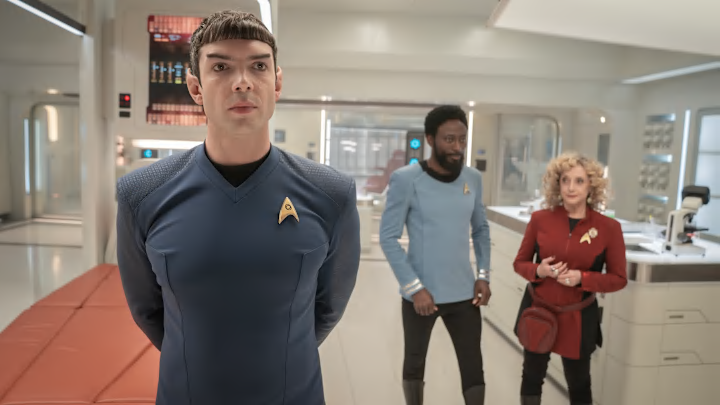It is here. The episode where the crew turns into Vulcans is here, and curiously, it is both not as bad and worse than I had feared. As another “comedic” episode of Strange New Worlds, “Four-and-a-Half Vulcans” is trying to be a humorous romp. Unfortunately, it stumbles over its own structure and pacing.
The basic plot of “Four-and-a-Half Vulcans” is that Captain Pike, Lt. Noonien-Singh, Ensign Uhura, and Nurse Chapel have to use a special serum to transform into Vulcans for a mission. After the mission is completed, however, they are not able to revert to humans, much to the annoyance of everyone else on the Enterprise, including Mr. Spock.
Although “fixing” the serum is accomplished fairly early in the episode, the Vulcanized crew insists on remaining Vulcans until Spock and Number One persuade an old flame of Number One’s—a Vulcan katra expert, named Doug (Patton Oswalt)—to help them. After this, the crew becomes human again, and they must salvage the relationships they eroded as Vulcans.
The issues with this episode are multifaceted, but they fall into two basic categories: tenuous Star Trek lore and flawed television storytelling. The first category of issues is arguably only a concern for Star Trek fans, but the second category is an issue for anyone watching the show.

Lore issues
The lore issues in “Four-and-a-Half Vulcans” revolve around the flawed portrayal of Vulcans in the episode. There are minor nitpicks, like Spock eating with his hands in the opening scene (Enterprise establishes that Vulcans prefer not to grasp their food), but there are also broader mischaracterizations of Vulcans.
The biggest issue most fans will have is that the human characters suddenly become emotionless and logical as soon as they turn into Vulcans. They also become very prejudiced towards Spock. Vulcans’ logic (and sense of superiority to non-Vulcans) are cultural traits that are learned. The episode claims the serum somehow passes these traits along. Frankly, this stretches credulity.
Even accepting that explanation, however, the Vulcans feel off. Vulcans have been consistently depicted in Star Trek as being calm and somewhat condescending, but socially gracious. In this episode, they are depicted as robotic and monotonous, with very few social graces—except for La’an, whose Augment ancestry makes her act like a Romulan for some reason.
These issues can be annoying to Star Trek fans, because they make it difficult to reconcile the events of Strange New Worlds with other Star Trek shows and films. We have seen full-blooded Vulcan characters lie, use contractions, and behave with social grace and sophistication throughout Star Trek, yet this episode would have us believe that Vulcans are like TNG’s Data.
Because Vulcans are among the most fully developed alien species and cultures in Star Trek, making an episode about them demands a certain level of knowledge and understanding to keep it believable within the broader narrative. Otherwise, it will ring false and undermine whatever emotional point the writers are trying to make.

This episode was not good television
Setting aside the complaints about lore, this episode is not very well put together. Major plot moments are explained away in log-style voice-overs, and there are so many subplots with each Vulcanized character that the broader story is hard to connect with. Everything feels rushed, and the jokes don’t have time to land.
“Four-and-a-Half Vulcans” does not provide much of anything in the way of an emotional payoff, either. Events occur, and then the episode ends. The story could have flowed better if only one or two human characters turned into Vulcans (physiologically, but not culturally), and through that experience, they come to understand what Spock (and every other Vulcan) endures.
Patton Oswalt’s Doug—a Vulcan who comes from a family fascinated by humans—is one positive to this episode. Rather than being a side character, however, an entire episode could have probably centered around him.
Ever since this episode was teased last year, it has been begging a lot of questions. With it now released, I am disappointed, but not entirely surprised. So much of the plot had to be rationalized through dialogue alone that the premise should have been scrapped and completely reworked.
